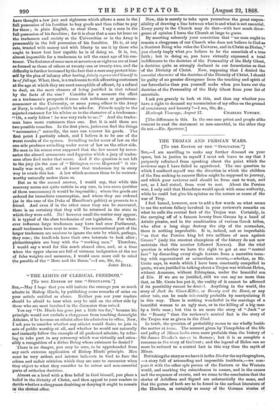"THE LIMITS OF CLERICAL FREEDOM."
[To THE EDITOR OF THE "SPECTATOR."]
SIR,—May I hope that you will imitate the courage you so much admire in Bishop Hinds, by publishing some remarks of mine en your article entitled as above. Neither you nor your readers should be afraid to hear what may be said on the other side by those who are most involved in the discussion thus raised.
You say "Dr. Hinds has gone just a little too far," because his principle would not exclude a clergyman from teaching downright Atheism, if he became an atheist after his admission to office. Now, I ask you to consider whether any atheist would desire to join in acts of public worship at all, and whether he would not naturally and instantly follow the example of all professed atheists, by refus- ing to take part in any ceremony which was virtually and osten- sibly a recogeition of a divine Being whose existence he denied ?
There is no danger, you may be sure, to be apprehended from any such extreme application of Bishop Hinds' principle. Men must be very ardent and intense believers in God to face the odium and unfair criticism which they are sure to encounter when they object to what they consider to be minor and non-essential parts of orthodox doctrine.
Almost on a level with a firm belief in God himself, you place a belief in the divinity of Christ, and then appeal to your readers to deeide whether a clergyman doubting or denying it ought to remain in the clerical office.
Now, this is merely to take upon yourselves the great respon- sibility of drawing a line between what is and what is not essential. Every party in the Church may do that—with how much diver- gence of opinion I leave the Church at large to guess.
By asserting solemnly your conviction that "no man ought to remain a clergyman of our Church who does not believe in God as a Sentient Being who rules the Universe, and in Christ as Divine," you clearly imply what you believe to be the essentials of a true faith ; but in doing so, you have virtually expressed a total indifference to the doctrine of the Personality of the Holy Ghost, a doctrine quite as strongly declared in our formularies as that of the Divinity of Christ. Now, supposing that I denied the essential character of the doctrine of the Divinity of Christ, I should be guilty of no greater divergence from the teaching and spirit of our formularies than you yourself make when you leave out the doctrine of the Personality of the Holy Ghost from your list of essentials.
I ask you gravely to look at this, and then say whether you have a right to demand my renunciation of my office on the ground of consistency and honesty ?—I am, Sir, &c.,
Ilealaugh Vicarage,- August 17. CHARLES VOTSEY.
[The difference is this. In the one case priest and people alike consent to read the statement as non-essential, in the other they do not.—En. Spectator.]






























 Previous page
Previous page